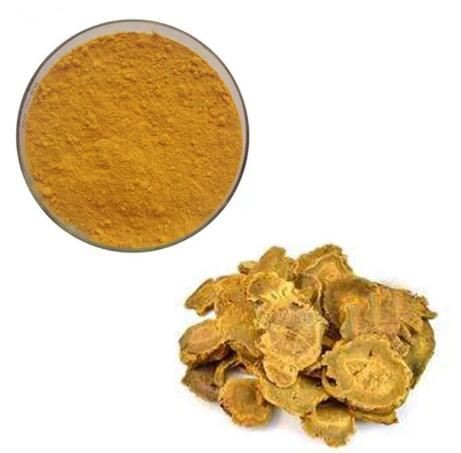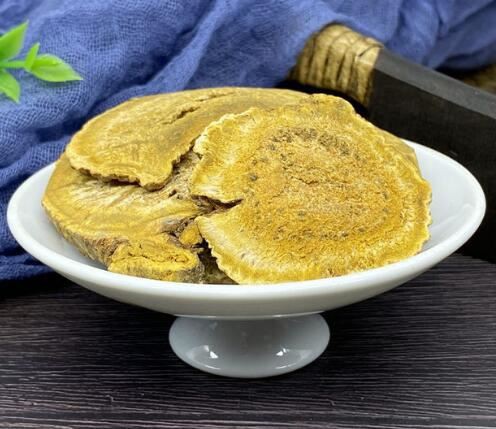What is Chinese Rhubarb Powder?
Chinese Rhubarb Powder,Da Huang is a Traditional Chinese Medicine for Purgatives Excess and Drain Heat.Rheum officinale, R. palmatum and R. tangutucm go by the name “Chinese rhubarb” in Western herbalism.
Chinese herbalists and botanists, however, do make a distinction between the rhubarb species growing in south China (R. officinale) and the two species (R. palmatum and R. tangutucm) that are indigenous to the northern part of the country. One or more of these species are cultivated on a large-scale in China and now Korea.
Chinese rhubarb root powder is a hardy species and often escapes cultivation and becomes wild. The plant persists as a weed in many gardens and roadside ditches. It thrives in full sun and well-drained soil.

Basic Information:
Name: | Rhubarb Powder |
CAS No: | 518-82-1 |
Appearance: | yellow needle crystal powder |
Molecular Formula: | C15H10O5 |
Molecular Weight: | 270.23 |
Herb Sourse: | rhubarb |
Part used: | root |
Spec: | 98% |
Testing method: | HPLC |
Active ingredient: | Emodin |
Particle size: | 100% pass 80 mesh |
EINECS: | 208-258-8 |
Shelf Life: | 2 years if properly stored. |
Storage: | Cool and dry place,keep away from strong light & high temp |
Package: | 25kg /drum,or as per customer's requests. |

Chinese Rhubarb Powder Benefits:
Rhubarb has long been used as an , , anti-fibrotic and medicine in China.
1) Liver Disease
Non-Alcoholic Fatty Liver Disease
In a clinical trial of 232 people, A Chinese herbal medicine containing rhubarb called Danning Pian improved non-alcoholic fatty liver disease symptoms and reduced ALT levels, a marker of liver damage. Chinese rhubarb root powder has the potential to boost liver function, reduce fatty liver, and improve bile flow – alongside conventional treatments.
2) Kidney Disease
In people with chronic kidney failure, levels of blood urea nitrogen (BUN) and creatinine are often high, as the kidneys struggle to eliminate waste products from the blood. Supplementation with 1 g/day of chinese rhubarb powder normalized levels of BUN, creatinine, and other waste products in 48 patients.
Kidney Inflammation
In a clinical trial of 32 people with kidney inflammation, a rhubarb-containing Chinese herbal remedy (Decoction of Qingre Huoxue) added to steroidal drugs improved kidney function better than the drugs alone. This remedy may allow for the dosage of steroids to be lowered while achieving equal benefits.
3) Menopausal Symptoms
In a clinical trial of 109 women approaching menopause, a rhapontic rhubarb supplement reduced improved the quality of life and reduced symptoms such as the frequency and severity of hot flashes. Importantly, this supplement didn’t alter gynecological factors such as uterus health or bleeding.
Two more trials with over 200 women found similar benefits.
ERr 731 also reduced anxiety from moderate-severe to slight, aside from reducing hot flashes in another clinical trial of 109 women transitioning to menopause.
4) Pancreas Inflammation
According to a meta-analysis of 16 clinical trials with over 900 people, chinese rhubarb root powder used with standard treatment is effective and safe for reducing pancreatic inflammation.
In a clinical trial of 126 people with severe inflammation of the pancreas, the use of Chinese rhubarb powder (15 g, 1 – 2x/day) with a specific nutrition plan lowered inflammation, disease severity, and liver and kidney damage.
5) Herbicide/Pesticide Poisoning
A meta-analysis of 12 studies concluded that Chinese rhubarb has a beneficial effect on people with pesticide poisoning. The low quality of some studies is a potential drawback to the results.
10 g/day of Chinese rhubarb in combination with other herbs, stomach washing, and clay, was effective for herbicide poisoning. This protocol helped eliminate toxins, reduced their absorption, sped up recovery time, and prevented damage to multiple organs.
Chinese rhubarb powder combined with mineral powder and blood purification was more effective at treating severe herbicide poisoning than the standard procedure. Rhubarb reduced the duration of the hospital stay and the use of artificial breathing machines, helping the patients recover consciousness more quickly.
6) Gut Disorders
In a clinical trial of 30 people, Chinese rhubarb (10 g/day, fed nasally 3x/day) added to the normal treatment improved gut function.In another trial of 89 critically-ill children, a Chinese herbal remedy (Fu’an Liquid) added to conventional drugs successfully reduced gut dysfunction. Even though a greater number of treated children survived, death rates were still high (30%).
7) Complications of Blood Poisoning (Sepsis)
In a meta-analysis of 15 clinical trials with 869 patients, rhubarb powder in combination with standard treatment improved gut dysfunction, inflammatory markers, and platelet count but didn’t reduce mortality. In a study with over 1,000 patients with sepsis, Chinese rhubarb reduced fungal infections, especially when combined with adequate nutrition (via stomach tubes or IV).
Similarly, 50 mL, 3x/day of a Chinese herbal (Hengyan medicine) used with conventional medication decreased levels of the inflammatory agents IL-6, IL-10, and TNF-α in a clinical trial of 45 people with sepsis.
8) High Cholesterol
Consuming 27 g/day of ground rhubarb stalks reduced total and LDL cholesterol by 8 – 9% in 10 men, but the study lacked a control group.Similarly, in a clinical trial of 83 people with clogged arteries, a Chinese rhubarb preparation (50 mg/kg) lowered total and LDL cholesterol and also improved artery health. In pregnant women with high blood pressure, Chinese rhubarb reduced levels of triglycerides and LDL cholesterol, while increasing levels of HDL cholesterol.
9) High Blood Pressure
A Chinese herbal with rhubarb (Jiangzhuoqinggan) was as effective as the standard drug, irbesartan, at reducing both systolic and diastolic blood pressure.
Pregnancy can temporarily cause high blood pressure. A low dose of Chinese rhubarb (0.75 g/day) was able to reduce the rates of this condition in 333 pregnant women at high risk.
10) Inflammation
Systemic inflammatory response syndrome (SIRS) causes widespread inflammation. In 78 people with SIRS, Chinese rhubarb powder added to the conventional treatment helped cure the disease, and reduced organ damage and deaths. It probably acted by lowering inflammatory substances such as TNF-alpha and C-reactive protein (CRP).
11) Stroke Recovery
In a meta-analysis of studies with nearly 1,000 participants, Chinese herbal mixtures containing rhubarb, in addition to conventional medication, helped patients recover from strokes by reducing the severity of their post-stroke symptoms.
12) Mouth Ulcers (Canker Sores)
Chinese rhubarb extract (5%) was moderately effective at speeding the healing from recurring mouth ulcers in a clinical trial of 125 people.
13) Herpes Sores
In 145 patients, a sage and Chinese rhubarb (23 mg/g) topical cream had a similar efficacy as a common herpes medication (Zovirax) at healing herpes sores.
Chinese Rhubarb Powder Uses:
Rhubarb powder is extensively used in traditional Chinese medicine. Rhubarb has been studied for the management of GI and renal function disorders, and for the treatment of hyperlipidemia, cancer, and acute ischemic stroke. However, sound clinical evidence for its use is lacking.
Contact us:
Phone:+16263716327
Email: [email protected]
Hot Tags: chinese rhubarb powder, suppliers, manufacturers, factory, wholesale, buy, price, quotation
Curated Products
Provide Curated Products for all product over $100
Handmade
We ensure the product quality that is our main goal
Natural Food
Return product within 3 days for any product you buy
Free home delivery
We ensure the product quality that you can trust easily






